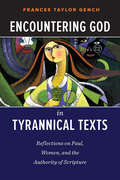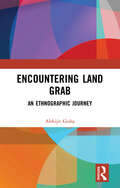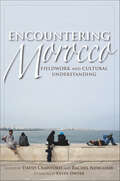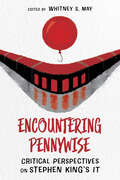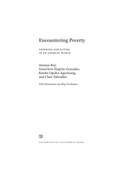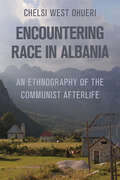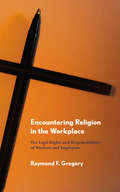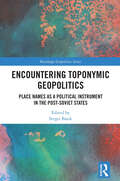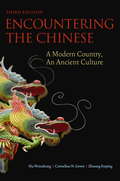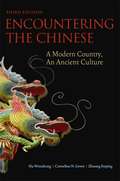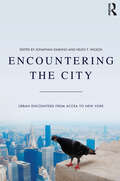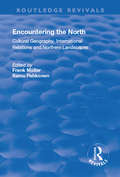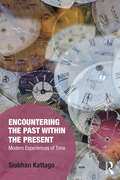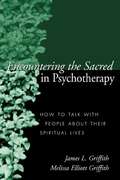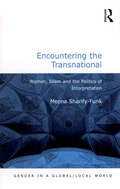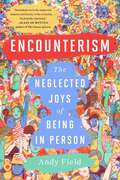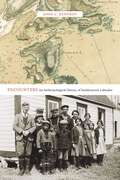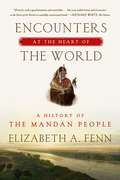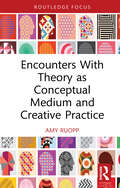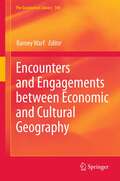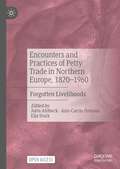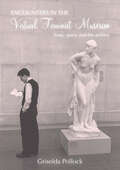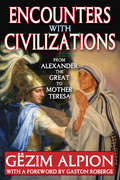- Table View
- List View
Encountering God in Tyrannical Texts: Reflections on Paul, Women, and the Authority of Scripture
by Frances Taylor GenchThe Bible includes any number of "tyrannical texts" that have proved to be profoundly oppressive in the lives of many people. Among them are Pauline texts that have circumscribed the lives and ministries of women throughout Christian history. What are people who honor Scripture to do with such texts, and what does it mean to speak of biblical authority in their presence? In Encountering God in Tyrannical Texts, Frances Taylor Gench provides strategies for engaging such texts with integrity-- that is, without dismissing them, whitewashing them, or acquiescing to them--and as potential sources of edification for the church. Gench also facilitates reflection on the nature and authority of Scripture. Encountering God in Tyrannical Textsprovides access to feminist scholarship that can inform preaching and teaching of problematic Pauline texts and encourages public engagement with them.
Encountering Land Grab: An Ethnographic Journey
by Abhijit GuhaTaking possession of private land for ‘public purpose’ by the eminent domain of the state is a global phenomenon, but it displaces and marginalizes the people at the local-level. The researchers have mainly dealt with this phenomenon either from the field, or from the archive. In this book, the author has studied the observable fact of land grab, or acquisition for industries in a particular locale of the West Bengal State by combining the field and archive in a unique mode through a multi-sited ethnographic ‘journey’. Unlike the traditional anthropological ethnographies consisting of single ‘tribes’ or ‘multi-caste villages’, this vertical ethnographic voyage of the author led him to come across a group of dispossessed peasants in the villages, a bunch of files in the district land acquisition department, a rich text of proceedings in the West Bengal Assembly Library, the growing global literature on land grab, and also to reflect on his dialogues with the elected members of the parliamentary standing committee at New Delhi. Ethnography, for the author was the road map, which guided his journey in these apparently separate existential domains of land acquisition and throws new light on how development policies are made, and how they failed, and what were the lessons learnt.Please note: Taylor & Francis does not sell or distribute the Hardback in India, Pakistan, Nepal, Bhutan, Bangladesh and Sri Lanka.
Encountering Morocco: Fieldwork and Cultural Understanding (Public Cultures Of The Middle East And North Africa Ser.)
by Kevin DwyerEncountering Morocco introduces readers to life in this North African country through vivid accounts of fieldwork as personal experience and intellectual journey. We meet the contributors at diverse stages of their careers–from the unmarried researcher arriving for her first stint in the field to the seasoned fieldworker returning with spouse and children. They offer frank descriptions of what it means to take up residence in a place where one is regarded as an outsider, learn the language and local customs, and struggle to develop rapport. Moving reflections on friendship, kinship, and belief within the cross-cultural encounter reveal why study of Moroccan society has played such a seminal role in the development of cultural anthropology.
Encountering Palestine: Un/making Spaces of Colonial Violence (Cultural Geographies + Rewriting the Earth)
by Mark Griffiths Mikko JoronenEncountering Palestine: Un/making Spaces of Colonial Violence, edited by Mark Griffiths and Mikko Joronen, sits at the intersection of cultural and political geographies and offers innovative reflections on power, colonialism, and anti-colonialism in contemporary Palestine and Israel. Organized around the theme of encountering and focusing on the ways violence and struggle are un/made in the encounter between the colonizer and colonized, the essays focus on power relations as they manifest in cultural practices and everyday lives in anti/colonial Palestine. Covering numerous sites in Gaza, the West Bank, East Jerusalem, and Israel, Encountering Palestine addresses a range of empirical topics—from marriage and queer aesthetics to policing, demolition, armament failure, and violence. The contributors utilize diverse theoretical frameworks, such as hyperreality, settler capitalism, intimate biopolitics, and politics of vulnerability, to help us better understand the cultural making and unmaking of colonial and anti-colonial space in Palestine. Encountering Palestine asks us to rethink how colonialism and power operate in Palestine, the ways Palestinians struggle, and the lifeways that constantly encounter, un/make, and counter the spaces of colonial violence.
Encountering Pennywise: Critical Perspectives on Stephen King’s IT (Horror and Monstrosity Studies Series)
by Whitney S. MayContributions by Amylou Ahava, Jeff Ambrose, Daniel P. Compora, Penny Crofts, Keith Currie, Erin Giannini, Whitney S. May, Fernando Gabriel Pagnoni Berns, Diganta Roy, Hannah Lina Schneeberger, Shannon S. Shaw, Maria Wiegel, and Margaret J. Yankovich First published in 1986, Stephen King’s novel IT forever changed the legacy of the literary clown. The subject of a TV miniseries and a two-part film adaptation and the inspiration for a resurgence of the evil clown figure in popular culture, IT's influence is undeniable, yet scholarship to date is almost exclusively devoted to the adaptations rather than the novel itself. Encountering Pennywise: Critical Perspectives on Stephen King’s “IT” considers the pronounced cultural fluctuations of IT's legacies by centering the novel within the theoretical frameworks that animate it and ensure its literary and cultural persistence. The collection explores the ways the novel, so like its antagonist, replicates (or disavows) the icons of various canons and categories in order to accomplish specific psychological and cultural work. Gathering the work of scholars from diverse professional and disciplinary vantage points, editor Whitney S. May has curated an anthology that spans discussions of American surveillance culture, intergenerational conflict, the legacies of settler colonialism and Native American representation, serial-killer fanaticism, and more. In this volume, we read the protagonists’ constellations of countermoves against Pennywise as productive outlines of critique effectuated by the richness of the clown’s reflective power. The essays are therefore thematically arranged into a series of four categories of “counter”—countercurrents, countercultures, counterclaims, and counterfeits—where each supplies a specific critical lens through which to view Pennywise’s disruptions of both culture and cultural critique.
Encountering Poverty: Thinking and Acting in an Unequal World
by Ananya RoyEncountering Poverty challenges mainstream frameworks of global poverty by going beyond the claims that poverty is a problem that can be solved through economic resources or technological interventions. By focusing on the power and privilege that underpin persistent impoverishment and using tools of critical analysis and pedagogy, the authors explore the opportunities for and limits of poverty action in the current moment. Encountering Poverty invites students, educators, activists, and development professionals to think about and act against inequality by foregrounding, rather than sidestepping, the long history of development and the ethical dilemmas of poverty action today.
Encountering Race in Albania: An Ethnography of the Communist Afterlife
by Chelsi West OhueriEncountering Race in Albania is the first book to interrogate race and racial logics in Albania. Chelsi West Ohueri examines how race is made, remade, produced, and reproduced through constructions of whiteness, blackness, and otherness. She argues that while race is often limited to Western processes of modernity that exclude Eastern Europe, racialization processes are global, and the ethnography of everyday Albanian socialities makes visible how race operates. Historical and political science frameworks prevail in the study of post-Cold War East European societies, yet as West Ohueri shows, anthropological and ethnographic knowledge can equip scholars to ask questions that they might otherwise not consider, illustrating how racialization is ongoing and enduring in a period that she terms the communist afterlife. Encountering Race in Albania, through the unexpected optic of Albania, a small, formerly communist country in Southeast Europe, offers significant insights into into broader understandings of race in a global context.
Encountering Religion in the Workplace: The Legal Rights and Responsibilities of Workers and Employers
by Raymond F. GregoryGregory, the author of other books on workplace issues, examines court cases arising under Title VII of the Civil Rights Act of 1964 and the First Amendment related to workplace religious disputes. Focusing on the limitations of practicing beliefs at work, he uses cases that illustrate different aspects of religious employment disputes and provides case summaries, so that general readers can better make decisions about work situations, as well as aiding lawyers who do not specialize in employment law. He addresses legal definitions of religion and details cases related to discrimination at various stages of the employment relationship, claims arising out of employment termination, proselytization, employer liability for religious harassment, discrimination experienced by specific groups, public sector issues, exemptions for religious organizations and ministers, accommodation, and retaliation and other issues. Annotation ©2011 Book News, Inc. , Portland, OR (booknews. com)
Encountering Toponymic Geopolitics: Place Names as a Political Instrument in the Post-Soviet States (Routledge Geopolitics Series)
by Sergei BasikThis book provides cutting-edge insights on contemporary geopolitical toponymic policy and practice in post-Soviet countries. It examines the political features of place naming as a reflection of contemporary political discourse. With multidisciplinary insights from leading scholars, chapters explore a range of topics drawing on critical political toponymy and traditional methods. Contributions examine how the toponymic system can act as a symbol of national identity, the regional geopolitics of toponymy, and geopolitical patterns in contemporary renaming. The historical roots of toponymic decolonization are analyzed, as well as indigenous toponymy and politics, and toponymic aspects of people's daily lives. The book explores a wide range of processes in the post-Soviet realm, including power, identity, economy, social order, and how political power is changing/transforming. It considers how these processes are distributed through various geopolitical and political-economic technologies. Offering empirically rich research from a variety of regions to give insights beyond "Western" perspectives, this book is the first to provide an in-depth exploration of post-Soviet place naming. It will appeal to students and researchers in human geography, politics, sociology, Eastern European studies, onomastics and cultural studies.
Encountering the Chinese: A Modern Country, An Ancient Culture
by Hu Wenzhong Cornelius GroveDecode Chinese values and cultural norms while identifying cross-cultural factors that often lead to failed business negotiations with Encountering the Chinese. In this third edition, the advice and recommended skills enable Westerners and the Chinese to establish more effective and rewarding relationships, both inside and outside of the People's Republic of China.
Encountering the Chinese: A Modern Country, an Ancient Culture
by Cornelius N. Grove Hu Wenzhong Zhuang EnpingChina is in the midst of unprecedented economic and cultural growth. In the last decade alone, China joined the World Trade Organization, hosted the 2008 Olympics and experienced a remarkable, record-high increase in its foreign currency reserves. As these changes unfold, frequency of contact between the Chinese and Westerners is dramatically increasing in the office, the classroom and the home.With thought-provoking glimpses into history and tradition, Encountering the Chinese provides fundamental information on Chinese cultural norms and values, giving clear context for contemporary social standards. Readers will learn the etiquette necessary to build successful personal and professional relationships with the Chinese both inside and outside the People's Republic of China. This revised edition of Encountering the Chinese also explains how Chinese values are changing rapidly-and why it is more important than ever to keep up. For instance, compliments, once declined out of modesty, are now widely accepted in coastal cities; and some terms of address that were proper to use only a decade ago have grown offensive. Encountering the Chinese provides invaluable insight into the diverse and changing Chinese culture.
Encountering the City: Urban Encounters from Accra to New York
by Jonathan Darling Helen F. WilsonEncountering the City provides a new and sustained engagement with the concept of encounter. Drawing on cutting-edge theoretical work, classic writings on the city and rich empirical examples, this volume demonstrates why encounters are significant to urban studies, politically, philosophically and analytically. Bringing together a range of interests, from urban multiculture, systems of economic regulation, security and suspicion, to more-than-human geographies, soundscapes and spiritual experience, Encountering the City argues for a more nuanced understanding of how the concept of 'encounter' is used. This interdisciplinary collection thus provides an insight into how scholars' writing on and in the city mobilise, theorise and challenge the concept of encounter through empirical cases taken from Africa, Asia, Australia, Europe, North America and South America. These cases go beyond conventional accounts of urban conviviality, to demonstrate how encounters destabilise, rework and produce difference, fold together complex temporalities, materialise power and transform political relations. In doing so, the collection retains a critical eye on the forms of regulation, containment and inequality that shape the taking place of urban encounter. Encountering the City is a valuable resource for students and researchers alike.
Encountering the North: Cultural Geography, International Relations and Northern Landscapes (Marginal Regions (and In Association With Igu - Dynamics Of Marginal And Critical Regions) Ser.)
by Frank Möller Samu PehkonenThis title was first published in 2003. This volume is concerned with the European north above the Arctic Circle and its representations in Cultural Geography and International Relations. The chapters in the book deal with cultural, geographical and political imaginations of northern peoples and landscapes. Emphasis is placed on the triangle of and interrelationship between culture, geography and politics. The historical and contemporary variations of meaning assigned to the north point to real processes which need to be studied in their own right. To achieve this aim, the book does not plainly specify the sites and levels of discourses (be they academic, political or popular), but it does take into account the material circumstances making the context of the European north. Illustrated by a coherent set of specially written case studies, the volume explores issues such as history, literature, gender, folk culture, pictorial representations, environment and climate change and links these issues with the (geo-)politics of the region.
Encountering the Past within the Present: Modern Experiences of Time (Memory Studies: Global Constellations)
by Siobhan KattagoEncountering the Past within the Present: Modern Experiences of Time examines different encounters with the past from within the present – whether as commemoration, nostalgia, silence, ghostly haunting or combinations thereof. Taking its cue from Hannah Arendt’s definition of the present as a time span lying between past and future, the author reflects on the old philosophical question of how to live the good life – not only with others who are physically with us but also with those whose presence is ghostly and liminal. While tradition may no longer command the same authority as it did in antiquity or the middle ages, individuals are by no means severed from the past. Rather, nostalgic longing for bygone times and traumatic preoccupation with painful historical events demonstrate the vitality of the past within the present. Divided into three parts, chapters examine ways in which the legacies of World War II, the Holocaust and communism have been remembered after 1945 and 1989. Maintaining a sustained reflection on the nexus of memory, modernity and time in tandem with ancient questions of responsibility for one another and the world, the volume contributes to the growing field of memory studies from a philosophical perspective. As such, it will appeal to scholars of sociology, social theory and philosophy with interests in collective memory and heritage.
Encountering the Sacred in Psychotherapy
by Melissa Elliott Griffith James L. GriffithDrawing on narrative, postmodern, and other therapeutic perspectives, this book guides therapists in exploring the creative and healing possibilities in clients' spiritual and religious experience. Vivid personal accounts and dialogues bring to life the ways spirituality may influence the stories told in therapy, the language and metaphors used, and the meanings brought to key relationships and events. Applications are discussed for a wide variety of clinical situations, including helping people resolve relationship problems, manage psychiatric symptoms, and cope with medical illnesses.
Encountering the Transnational: Women, Islam and the Politics of Interpretation (Gender in a Global/Local World)
by Meena Sharify-FunkWhen Muslim women from diverse national and cultural contexts meet one another through transnational dialogue and networking, what happens to their sense of identity and social agency? Addressing this question, Meena Sharify-Funk encountered women activists and intellectuals in North America, the Middle East, South Asia and Southeast Asia - women whose lives and visions have become linked by 'the transnational' despite their differing circumstances and intellectual backgrounds. The resultant work provides a rich and cliché-bursting account of women's reflections on a wide range of topics including: the status of women in Islam, the role of women as interpreters of religious norms, the relationship between secular and religious forms of self-identification, perceptions of Islamic-Western relations, experiences of marginalization, and opportunities for empowerment. Giving careful attention both to common threads in Muslim women's experiences and to the unique voices of remarkable women, this is a compelling account of conversations that are bringing new energy and dynamism into women's activism in a world of collapsing distances.
Encountering the World with I-Docs: Interactive Documentary as a Research Method (Creative Research Methods in Practice)
by Ella HarrisInteractive documentaries, or i-docs, are web based, multimedia documentaries that immerse audiences through dynamic, interactive platforms. This book unlocks the value of i-docs as a creative research method, providing an engaging guide on how to use i-docs to examine and communicate research subjects. With examples, conceptual discussion, and practical advice, the book explores how i-docs can illuminate topics including temporalities, power and space, affect and feeling, freedom, and epistemic justice. The book addresses i-docs as a digital form but also shows that even just planning an i-doc on paper can open up new analytical perspectives. Key features of the book include: - An easy to use template for planning your own i-doc; - Advice on how researchers can ‘think with i-docs’ without even producing one; - Discussion of methodological work with i-docs including participatory i-doc making; Insights into a range of examples of commercial, activist and research i-docs from around the world. This book is a valuable resource for scholars, students, community researchers, creatives and activists who want to enlist and ignite the possibilities of i-docs.
Encounterism: The Neglected Joys of Being In Person
by Andy FieldA playful, analytical, informed, and poetic exploration of the delight and transformative power of real-life encounters. The light touch of a hairdresser’s hands on one’s scalp, the euphoric energy of a nightclub, huddling with strangers under a shelter in the rain, a spontaneous snowball fight in the street, a daily interaction with a homeless man—such mundane connections, when we closely inhabit the same space, and touch or are touched by others, were nearly lost to “social distancing.” Will we ever again shake hands without a thought? In this deeply rewarding book, Andy Field brings together history, science, psychology, queer theory, and pop culture with his love of urban life and his own experiences—both as a city-dweller and as a performance artist—to forge creative connections: walking hand-in-hand with strangers, knocking on doors, staging encounters in parked cars. In considering twelve different kinds of encounters, from car rides to video calls to dog-walker chats in the park, Field argues “that in the spontaneity and joy of our meetings with each other, we might find the faint outline of a better future.”
Encounters
by John C. KennedyPart anthropological history, part informed critique, Encounters examines the relations between the people of southeastern Labrador and the many visitors who have come to fish, heal the sick, and extract the region's resources. John Kennedy presents the latest archaeological, genealogical, and ethno-historical research that changes scholarly understandings of southeastern Labrador. Departing from the conventional view that coastal Labrador has distinct Inuit and non-Inuit regions, he argues that the coast should be viewed as a continuum of "Inuitness." Encounters unravels the social implications of the region's complex mercantile fishery, describes how twentieth-century military and resource development have impacted Labrador's seasonal economy, and suggests that Newfoundland continues to use Labrador as a colony. Kennedy uses field research he conducted in 2013 to describe the origins, current economies, and future challenges of the region's tiny villages. Although he is a strong supporter of Aboriginal land claims, Kennedy explores the impact of identity politics in the region, showing how land claims based solely on geography can unintentionally create inequities. Drawing on decades of field and archival research, Kennedy demonstrates how Aboriginal politics are transforming society in southeastern Labrador, empowering local people to overcome the stigmas of history and finally acknowledge their Inuit ancestry.
Encounters At The Heart Of The World: A History Of The Mandan People
by Elizabeth A. FennWinner of the 2015 Pulitzer Prize for History<P><P> Encounters at the Heart of the World concerns the Mandan Indians, iconic Plains people whose teeming, busy towns on the upper Missouri River were for centuries at the center of the North American universe. We know of them mostly because Lewis and Clark spent the winter of 1804-1805 with them, but why don't we know more? Who were they really? In this extraordinary book, Elizabeth A. Fenn retrieves their history by piecing together important new discoveries in archaeology, anthropology, geology, climatology, epidemiology, and nutritional science. Her boldly original interpretation of these diverse research findings offers us a new perspective on early American history, a new interpretation of the American past.<P> By 1500, more than twelve thousand Mandans were established on the northern Plains, and their commercial prowess, agricultural skills, and reputation for hospitality became famous. Recent archaeological discoveries show how these Native American people thrived, and then how they collapsed. The damage wrought by imported diseases like smallpox and the havoc caused by the arrival of horses and steamboats were tragic for the Mandans, yet, as Fenn makes clear, their sense of themselves as a people with distinctive traditions endured.<P> A riveting account of Mandan history, landscapes, and people, Fenn's narrative is enriched and enlivened not only by science and research but by her own encounters at the heart of the world.
Encounters With Theory as Conceptual Medium and Creative Practice
by Amy RuoppEncounters with Theory as Conceptual Medium and Creative Practice explores the relationships and intersections between verbal and visual ways of researching, challenging the privilege of the written word in academe. Rooted in a grant-funded artistic research course, the data and experiences shared here illuminate the transformative power of visual thinking and visual literacy as a research data, analysis as well as artifact. The book begins by outlining the author's background as an artist/researcher/teacher, laying a foundation for the positionality and thinking within the book. The later chapters, offered as vignettes, share the explorations and subsequent discoveries of emerging scholars from a variety of backgrounds and disciplines. A/R/Tography takes a front seat serving as a messy and fluid architecture for theory put into practice. Engaging tension as a catalyst for disruption, the book explores how staying present, intra-acting with ideas, concepts, and theory through visual material exploration expands attention and illuminates data in different ways, affording unexpected insight and discovery. In addition, the image-rich pages invite readers into reading the visual in conversation with the verbal, on equal terms. One is not in service of the other, rather a conversation of literacies. With its emphasis on the visual and materiality as a method of thinking, this book will be of interest to anyone interested in or practicing artistic research. One does not need to have an arts background to engage in visual dialog.
Encounters and Engagements between Economic and Cultural Geography
by Barney WarfThe intellectual renaissance of human geography has included a widespread engagement between its economic and cultural subdisciplines. This volume adopts a variety of conceptual and empirical perspectives on the encounters between economic and cultural geographers. It offers an introduction and 10 chapters by authors in a variety of national contexts to explicate issues such as the cultural turn in economic geography, the cultural construction of economic geographic thought, consumption, gender, everyday life, commodity chain analysis, trust, networks, the creative economy, and tourism. The volume contains empirical analyses utilizing both quantitative and qualitative approaches at spatial scales ranging from the individual to the global economy. In illustrating how human geographers can ill afford to subscribe to the analytically false dichotomy between "culture" and "the economy," the book explicates how cultural and economic geography can be seamlessly integrated , bringing them into a creative tension to their mutual benefit.
Encounters and Practices of Petty Trade in Northern Europe, 1820–1960: Forgotten Livelihoods
by Jutta Ahlbeck Ann-Catrin Östman Eija StarkThis open access book uncovers one important, yet forgotten, form of itinerant livelihoods, namely petty trade, more specifically how it was practiced in Northern Europe during the period 1820–1960. It investigates how traders and customers interacted in different spaces and approaches ambulatory trade as an arena of encounters by looking at everyday social practices. Petty traders often belonged to subjugated social groups, like ethnic minorities and migrants, whereas their customers belonged to the resident population. How were these mobile traders perceived and described? What goods did they peddle? How did these commodities enable and shape trading encounters? What kind of narratives can be found, and whose? These questions pertaining to daily practices on a grass-root level have not been addressed in previous research. Encounters and Practices embarks on hidden histories of survival, vulnerability, and conflict, but also discloses reciprocal relations, even friendships.
Encounters in the Virtual Feminist Museum: Time, Space and the Archive
by Griselda PollockContinuing her feminist reconceptualisation of the ways we can experience and study the visual arts, world renowned art historian and cultural analyst, Griselda Pollock proposes a series of new encounters through virtual exhibitions with art made by women over the twentieth century. Challenging the dominant museum models of art and history that have been so exclusive of women's artistic contributions to the twentieth century, the virtual feminist museum stages some of the complex relations between femininity, modernity and representation.Griselda Pollock draws on the models of both Aby Warburg's Mnemosyne Atlas and Freud's private museum of antiquities as well as Ettinger's concept of subjectivity as encounter to propose a differencing journey through time, space and archive. Featuring studies of Canova 's Three Graces and women artist's modernist reclamations of the female body, the book traverses the rupture of fascism and the Holocaust and ponders the significance of painting and drawing in their aftermath. Artists featured include: Georgia O'Keeffe, Josephine Baker, Gluck, Charlotte Salomon, Bracha Ettinger and Christine Taylor Patten.
Encounters with Civilizations: From Alexander the Great to Mother Teresa
by Gezim AlpionEncounters with Civilizations is a broad-ranging work, uniting sweeping themes such as history, culture, the media, social issues, and politics. Building around comparative analyses of aspects of Albanian, Egyptian, British, and Indian cultures, Alpion addresses the problems people experience in their encounters with civilizations different from their birth cultures.The course of history has made the confrontation and comingling of different cultures inevitable. It has also engendered ambivalence toward the cultures involved, including a desire to emulate the new culture, or resentment, or conflicting attitudes toward the relative strength or weakness of both birth and new cultures. Alpion describes how Egyptian culture and politics have been shaped by foreign domination while retaining ancient customs at the social level. In comparison, Great Britain has been an imperial power whose cultural preeminence has shaped the images of smaller countries in the eyes of the world. Alpion writes of English images of his native Albania and offers a penetrating analysis of Mother Teresa as a Christian missionary in Hindu and Muslim India, focusing on her cultural presentation via the media and the cult of celebrity.Whether discussing the customs of Egyptian coffee houses or Alexander the Great as a defining figure in Western and Eastern culture, Alpion grasps the impact of these cultural encounters. He makes us aware that understanding and resolving such differences involves considering ultimate issues of life and death.
